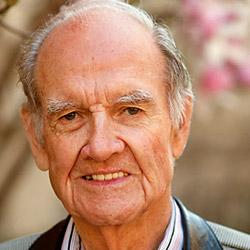 Former United States Senator, and Presidential candidate, George McGovern.
Former United States Senator, and Presidential candidate, George McGovern. In 2005, I had the good fortune to interview former Democratic presidential nominee George McGovern for Venice Magazine, in conjunction with the release of Stephen Vittoria's documentary "One Bright Shining Moment: The Forgotten Summer of George McGovern," which looked at McGovern's ill-fated 1972 bid for the White House. During our interview, and during a lengthy dinner at Kate Mantilini in Beverly Hills several months later, (which happened to fall on what would have been the 80th birthday of his close friend, Robert F. Kennedy), McGovern was thoughtful, direct, and kind-hearted; a gentleman and a gentle man. When we raised a glass to toast Bobby Kennedy's memory, Senator McGovern said quietly "Bobby made us all want to be better people." A more fitting valediction of George McGovern couldn't be said. Rest in peace.
GEORGE MCGOVERN SHINES ON
By
Alex Simon
Editor's Note: This article orginally appeared in the September 2005 issue of Venice Magazine.
George McGovern, for a brief moment, looked as if he was the man who could lift the United States out of its moral and spiritual slump that began with the tumultuous events of the 1960s, and seemed to be conflagrating by the minute as a second term of the Nixon administration loomed large on the horizon in 1972. As it often does, fate had other ideas. Instead of delivering the children to the promised land, Senator George Stanley McGovern of South Dakota suffered one of the worst defeats in the history of American presidential elections, winning 38% of the vote to Richard Nixon’s 60%, and losing in the Electoral College 520 to 17. He won in only two locations: Massachusetts and the District of Columbia. He even failed to win his home state of South Dakota, whose sons and daughters he’d loyally served for nearly a quarter century. As the man said, history is written by the winners. Less than two years later, “winner” Richard Nixon would resign in disgrace, and over time, George McGovern would come to be regarded as the hero, and savior, he nearly was.
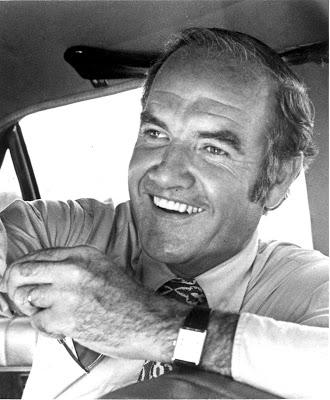 George McGovern grins during a high point in his 1972 grassroots campaign for the presidency.
George McGovern grins during a high point in his 1972 grassroots campaign for the presidency.George McGovern was born July 19, 1922 in Avon, South Dakota, the son of a Presbyterian minister. After studies at Dakota Wesleyan University were interrupted by WW II, McGovern volunteered for The United States Army Air Forces and served as a B-24 Liberator bomber pilot with the 15th Air Force. He flew 35 missions over hostile territory from North Africa to Italy and was awarded the Distinguished Flying Cross. McGovern’s wartime exploits were later recorded by renowned historian Stephen Ambrose in his book “The Wild Blue.”
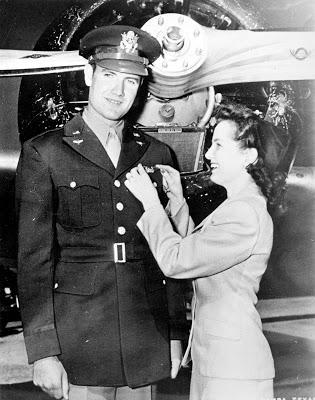 Eleanor McGovern pins silver pilot wings on her husband, newly-commissioned Second Lt. George McGovern, on April 15, 1944, at Pampa Army Air Field, Texas.
Eleanor McGovern pins silver pilot wings on her husband, newly-commissioned Second Lt. George McGovern, on April 15, 1944, at Pampa Army Air Field, Texas.After returning home from the war, McGovern finished his degree at Dakota Wesleyan, then went on to Northwestern University, where he earned a PhD in history, returning again to his alma mater as a professor. Although both McGovern’s parents were Republican, he claimed no political affiliation until the 1948 election, registering as an Independent, and later joining the newly formed Progressive Party, volunteering for the (unsuccessful) presidential campaign of former Vice President Henry A. Wallace. After hearing a 1952 radio broadcast of Governor Adlai Stevenson’s acceptance speech at the Democratic Convention, McGovern immediately changed his affiliation to the Democratic party, volunteering for Stevenson’s campaign. McGovern stayed active in Democratic politics, winning a seat in the House of Representatives in 1956.
Elected to the senate in 1962, McGovern went on to make a name for himself as a forthright, shoot-from-the-hip liberal who was outspoken against U.S. involvement in southeast Asia almost from the get-go (in spite of voting in favor of the Gulf of Tonkin Resolution, a vote he still regrets). After serving as the flagbearer for the supporters of recently-slain Senator Robert Kennedy at the disastrous 1968 Democratic convention in Chicago, McGovern became his party’s most outspoken critic of the Vietnam war, co-sponsoring the McGovern-Hatfield amendment in 1970, seeking to end U.S. participation in Vietnam through Congressional action. Running for President in ’72 on an anti-war platform, McGovern’s momentum was interrupted when his running mate, Senator Thomas Eagleton of Missouri, was revealed to have been hospitalized for depression on three occasions and been treated with electroshock therapy. Quickly replacing him with Kennedy brother-in-law Sargent Shriver did little to restore the damage that had been done to the once-hopeful campaign. After his defeat, George McGovern went on to serve honorably in the U.S. Senate, losing his seat in the 1980 Republican sweep that later became known as the “Reagan Revolution.”
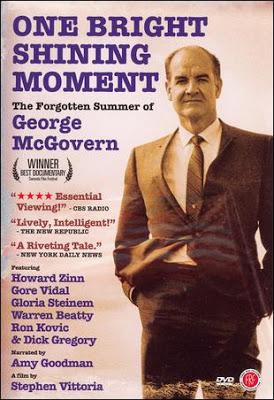
Filmmaker Stephen Vittoria has documented McGovern’s run for the White House in a new film entitled One Bright Shining Moment: The Forgotten Summer of George McGovern. Expertly combining archival footage with present day interviews, the film portrays a time long enough past to give the viewer objectivity—objectivity that clearly reveals little has changed in American politics in more than 30 years, particularly with regard to the kinds of people who win elections, and those who should have.
George McGovern spoke to us by phone from his home in South Dakota recently. Here’s some of what was said:
The first thing I’ve wanted to ask you since the 2004 election is, since your ’72 campaign platform revolved around your opposition to the war in Vietnam, let’s talk about some of the parallels you see between what’s happening today in Iraq and what happened in southeast Asia in the 60s and 70s.
George McGovern: One parallel is that neither country posed any direct threat to the United States, although we contended that each country posed a great potential threat to the United States, which turned out to be false in both cases. Secondly, in each case, we knew very little about the culture that we were going into. For example, we were told that Vietnam was just a puppet of China, when actually there had been a thousand years of tension, antagonism and bribery between Vietnam and China, which flared again after we pulled our troops out of Vietnam. China, and the troops that were recently fighting us squared off against each other. It was settled rather quickly, but our government tried to claim that Ho Chi Min was getting his orders from Mao Tse Tung and Beijing, when if fact he was not. But we didn’t know those things, and didn’t know the history of the area, and the same thing is pretty much true of Iraq. We didn’t understand the culture and the wishes of the people there, and we still don’t. A third parallel, although it’s not quite as close, is that what we did in Vietnam was to intercede in a strong revolutionary, grassroots movement that first was aimed at the French, and expelling them from their colonies, which they’d held for a hundred years, secondly aimed at the Japanese who occupied southeast Asia during WW II, and thirdly aimed at us, who came in after the French. So it’s not exactly the same as Iraq, but it’s similar in that there’s this very widespread insurgency moving across Iraq, and I don’t see it weakening in any way. It seems to be becoming more widely spread.
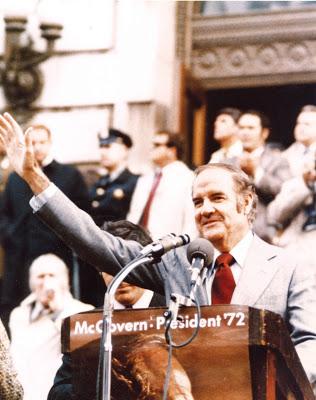 The senator rallies “McGovern’s Army,” with a speech in Syracuse, N.Y., Halloween 1972. When interrupted by church bells, McGovern exclaimed, “The bells are tolling for Richard Nixon!”
The senator rallies “McGovern’s Army,” with a speech in Syracuse, N.Y., Halloween 1972. When interrupted by church bells, McGovern exclaimed, “The bells are tolling for Richard Nixon!” Since we all know now in retrospect how Vietnam ended what do you see both in terms of the future of Iraq as a country and also in terms of American involvement.
The only thing I’m sure of is that we can’t dictate the outcome. I have no idea what’s going to happen after we withdraw. I suspect there will be continued internal conflict between the Sunni Muslims and the Shiite Muslims, and the Kurds in the north. They don’t like each other all that well. Whether or not they can get together eventually as a unified country is, I think, an open question. I don’t see how you can ever have a unified Iraq as long as we’re involved there. There’s always going to be a sizable group resisting this American occupation, so the best thing we can do is disengage our forces and then give them whatever help we can in terms of moving toward a unified, sovereign country. Also, I’d like to say that I was very disappointed in General Powell when he went to the United Nations and made what was supposed to be a scientific, factual presentation about the situation inside Iraq that turned out to be pretty flimsy material.
I think General Powell is disappointed in General Powell.
Well, he should be! (laughs) I’ve always had a high regard for him, but was very disappointed in that particular instance. You know, he even had questions about the Gulf War, ten years earlier. He wanted to hold on for six months while we sought an Arab solution to it.
When George W. Bush put Powell in his cabinet, that was the one ray of hope I had, because he was always the one person who had the guts to say ‘no’ to Bush’s dad.
I felt the same way. I had expected we’d get the same kind of level-headed and independent judgment this time, but I’m afraid we didn’t.
You’ve always epitomized what a true liberal stands for. How did your upbringing affect your political and social conscience?
Mitchell, South Dakota, where I still live, is a town of about 15,000 people. It’s in the agriculture part of the nation. While I wouldn’t describe it as a rural village, it’s a town that depends largely on agriculture for its economy. Second to that would be tourism. I was born in 1922, and that year the Depression began in the agricultural state. It didn’t hit the urban areas until the crash of the stock market in ’29. But the entire decade of the 1920s was a depression period for agricultural states because at the end of the first World War, the bottom fell out of the agricultural market. We were poor all during my growing up days, but I didn’t know that because everyone else was poor. But we had to watch our dollars very carefully. I learned at a very early age to practice a measure of economy, which has stayed with me. For that reason, I’m appalled at the way the Bush administration has ignored the huge annual deficits that they’re running, and have rolled up the national debt to an all-time high. They’ve added trillions to our national debt. I think some of those values that I had as a youngster have stayed with me. I’ve also carried with me a respect for the people who work the land, a respect for the elderly who hold on even when it’s difficult, respect for education which transformed my life from beginning to end, and a respect for matters of ethics and morality, and what are sometimes called “the things of the spirit,” and the material values of life: loyalty, truthfulness, diligence, integrity and honesty, those are things you can’t measure materially, but they have important spiritual and moral aspects. Those things were drilled into me as a youngster growing up in a Methodist parsonage.
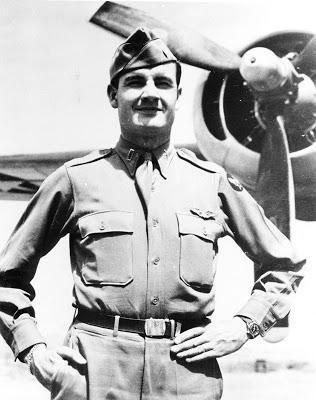 From his base in Cerignola, Italy, Lieutenant McGovern sent home this snapshot of himself in front of his B-24, the Dakota Queen.
From his base in Cerignola, Italy, Lieutenant McGovern sent home this snapshot of himself in front of his B-24, the Dakota Queen.You also did a tour of duty in Europe as a bomber pilot during WW II.
I was in Europe for a year, and in training for a year and half before I went overseas. I flew a full string of 35 combat missions over some of the most heavily defended targets in Europe. We were hitting Hitler’s oil refineries, his tank factories, his aircraft factories, his railway yards. Those were our prime targets.
How did that experience change you?
It gave me a new appreciation for the terrible character of war. I wasn’t a pacifist then, obviously. I’ve never regretted my service in World War II, but I developed a healthy respect for the destructive character of war, and it’s been one of the reasons I’ve been cautious about sending young Americans to die anywhere in the world, but especially in areas like Vietnam and Iraq that pose no threat to our security. When I was in the war, I was lucky that I was in a plane and never saw the carnage close-up.
If you had seen it up close, would your perception of the American role in WW II have been different?
I don’t think so. I thought we had to do everything humanly possible to smash Hitler’s war machine, and I’ve never changed my mind on that. Hitler was a monster, and was leaping across one country’s frontier to another. He was going to conquer Europe, and then take Russia before they got him stopped. He made the same mistake Napoleon made. (laughs)
Initially you thought about following your father’s footsteps and entering the ministry after the war.
I thought about it for a while, and they immediately assigned me to a student pastorate in the suburbs of Chicago. I just wasn’t temperamentally suited to the ministry. So I just moved across the (Northwestern University) campus and resumed and resumed an earlier, long time interest of mine in history. They had a marvelous department there. I still owe those professors a lot. I went all the way through to a PhD on the G.I. Bill, and I’ve never been sorry about that.
How were you not temperamentally suited to the ministry?
I felt awkward in the more or less “priestly” functions: ministering to people, conducting funerals and weddings, giving communion, that part just felt awkward to me. I felt more like a student or a teacher, which is my temperament, rather than giving pronouncements in a church.
Tell us how you decided to make the jump into politics. At the time, you had a certain measure of security as a professor at your alma mater, Dakota Wesleyan, and had a young family to support.
It was regarded as a very reckless thing to do, at that time. The Democrats were not strong in South Dakota at the time. The legislature had 110 people, only two of whom were Democrats. So it was 108-2. It was very unhealthy for the state. I saw a suppression of ideas and an unwillingness to look at other possibilities. So when the state democratic chairman invited me to take a leave of absence and organize a Democratic party, I decided to do it. I worked awfully hard at it, and after a couple years had enough support to run for Congress, and get elected. Before that, I got some 24 people elected to the South Dakota state legislature. Two years later, we elected a Democratic governor. We organized an excellent grassroots base out here in South Dakota, which still more or less exists.
As early as the late 50s you were aware of the situation in Vietnam and very vocal about it.
That’s right. I felt that there were social and political revolutions and upheavals convulsing that whole colonial part of the globe: in Africa, in Latin America, and especially in Asia. I had read a great book by Owen Lattimore called “The Situation in Asia,” which came out in ’49. He predicted these upheavals all across Asia. Even before I went to the Senate, I was opposed to any military involvement by the United States, or any other western country.
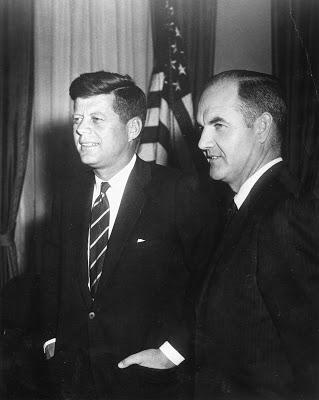 President John F. Kennedy appointed George McGovern to be the first director of his Food for Peace program.
President John F. Kennedy appointed George McGovern to be the first director of his Food for Peace program.Tell us about President Kennedy.
I was in the House when he was in the Senate. I got to know him then, and I got to know Bobby then, too. They were both friends of mine, and both campaigned for me when I was running for the Senate.
When you first met John Kennedy, what was your impression of him, and as you got to know him, how did those impressions change?
He was a highly intelligent person. He was an attractive, appealing figure in terms of personality, carriage and everything. People seemed to warm up to Kennedy almost instinctively. He would speak directly on things, and was a very engaging person. At the time he first started talking about running for President in 1960, I was supporting my next door neighbor, Hubert Humphrey, who literally lived right next door to me in Washington. Hubert actually found us our first house when I was a young Congressman. But when he dropped out after losing a couple primary elections, I switched my support to Jack Kennedy and that support remained from then on. I ran for the senate first in 1960 and was defeated. He always thought that he caused that defeat, because I only lost by 1% of the vote, whereas he lost South Dakota overwhelmingly. He became much more confident after he made it to the White House and at the time he was killed, he probably could have carried South Dakota (in the ’64 election).
Many historians argue that had he lived, history might not have been kind to him in terms of his performance as a politician. Do you agree or disagree with this?
I think a martyred President draws support from everybody, so he wouldn’t have had that going for him, but he also had run into a number of legislative jams in the Congress. Jack was not as skilled as someone like Lyndon Johnson in getting the Congress to do what he wanted them to do. Johnson was a master at understanding the members of the House and Senate: what their vulnerabilities were, what their interests were. He carried a lot of personal knowledge in his head about members of the Senate, in particular. He was even nicknamed “the master of the Senate.” Whereas John Kennedy just didn’t have that kind of long-standing intimate knowledge of the legislative process and the Republicans really handled him with a great deal of hostility, so it’s quite possible that had he lived, those partisan differences might have diminished his widespread popularity, but I just don’t know. I can see, however, how some historians might have come to that sort of a conclusion.
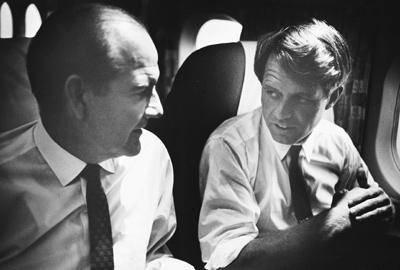 McGovern with Senator Robert F. Kennedy, during RFK's 1968 campaign.
McGovern with Senator Robert F. Kennedy, during RFK's 1968 campaign. Let’s talk about Robert Kennedy. From everything I understand, as brilliant as JFK was, Bobby had an even more impressive intellect than his brother did. Was this the case? It also sounds like the two of them were very different men personally on many levels. Is that accurate?
I think that John Kennedy was every bit as intellectually equipped as Bobby was. I would see the differences between the two men in this way: after the President’s death, Bobby became a more compassionate and sensitive person than he had been before. It wasn’t an intellectual transformation as much as it was an emotional and personal one. I think the suffering he went through in losing his older brother changed Bobby noticeably, and the notion that he was something of a ruthless, tough politician was a sort of misnomer after the death of his brother. He may have played it rough and tough when he was taking care of his brother’s political concerns in a management role of some kind, but we saw a different side of him when he lost Jack, whom he adored, and had to fend for himself. I think he became a better person, and certainly a more compassionate, deeply caring one in the last years of his life.
Once again, we’re engaging in conjecture, but had Robert Kennedy lived, do you think he would have gotten the Democratic nomination in ’68 and would have won in November?
I don’t think he would have gotten the nomination. I think Vice-President Humphrey had an overwhelming majority of the delegates nailed down. Bobby was campaigning through the last primary, and most of the delegates then had already been picked. As I recall, he had 143, which later went to me when I was talked into becoming his standard bearer after his death. That was the old system of getting delegates, which was done largely by insiders and political and municipal organizations. So I think Humphrey had the nomination pretty well locked in ’68.
You make an interesting comment in the film that you had sympathy for both the Chicago police and the demonstrators during the ’68 Democratic convention.
I think they were frightened of each other. The cops were basically young men too, as were the protestors. The cops didn’t have the educational background in most instances that the protestors had, who were to a considerable extent college students and faculty members. But Mayor Daley probably had it right when he said that riot wasn’t caused by the police, it was caused by the war in Vietnam. I think that’s true.
So you think even if Robert Kennedy and Martin Luther King hadn’t been killed earlier that year, the storm was already brewing, so to speak?
I’m not sure. I think that if they had both still been speaking out and counseling for peaceful action, it’s possible they might have been able to head off some of those eruptions.
One thing the film points out is that the Democratic party still hadn’t healed from the split it experienced in ’68. As a result, when you announced your candidacy in ’72, many of your fellow Democrats were scared by you, and viewed you as a radical voice. Did you feel that, at the time?
I knew that was true. I don’t know how they thought I got elected in South Dakota for a quarter century if I was such a radical! (laughs) That was what my enemies put out, though, and conservatives in the press put out the same charges. I always thought of myself as a moderate liberal, a fighter for peace and justice. I never thought of myself as being all that far out. I was described as the candidate of the three A’s: acid, amnesty and abortion.
Let’s talk about the debacle with Senator Eagleton, your initial running mate. How did you go about choosing him to begin with?
Well, it was a last minute thought. We were engaged in the California challenge for 30 days and nights around the clock to save our delegation that we had won by winning the California primary. So very little thought had gone into picking a running mate up to that point. Senator Eagleton we came to after seven people had turned us down. He was recommended by some of the people who’d declined themselves. Senator Ted Kennedy recommended him strongly, as did Senator Mondale. So did Mike Mansfield. There were a number of other senators I respected highly who recommended him. Gaylord Nelson was one. I thought on the basis of that, even though I didn’t know him very well and hadn’t served on any committees with him, that he’d be a good choice.
The tragedy of the situation was that he seemed like a genuinely decent man.
That’s true, and I think he would’ve been a good Vice-President. My inclination was to stay with him until all hell broke loose in the press, but I have to confess that I didn’t know much about mental illness at that point, and had no idea what a manic-depressive was. In fact, I spoke with one of the greatest psychiatrists in the country, Dr. Carl Menninger. He said that he’d been lecturing on mental illness for more than 40 years. He said “I can tell you conservatively that half the American people are scared to death of mental illness and I don’t see how you can carry this election with a man who has a history of mental illness on the ticket. On the other hand, almost every family in the country has had someone in their family suffer from some form of mental illness and they’ll never forgive you if you ask Eagleton to step down.” To which I replied ‘So you’re saying I’m damned if I do, and damned if I don’t.’ He said “That’s the way I see it,” and he turned out to be right.
Let’s talk about your subsequent choice of Sargent Shriver as your running mate. This is a great American and great man who dedicated his life to public service, but he was trounced by much of the press as being “Kennedy-lite.”
He was a wonderful choice and performed exceedingly well. We tried to get him originally, but he was in Russia and we couldn’t reach him. He was a practicing attorney at the time in Washington and was in the Soviet Union on some kind of legal business. He and Eagleton were very good friends, too. I think it was very unfair the way many members of the press treated him and, of course, his record in public life speaks for itself.
Many political analysts have pointed out that the ’72 Democratic convention, while it had a tremendous energy to it, and looked unlike any convention that had been held in the U.S. before, its enthusiasm also contained a great of naiveté, and as a result, was very unorganized, particularly because your acceptance speech was broadcast after midnight in much of the country.
I think that was the biggest mistake of the convention: we forgot we were on primetime television with 80-90 million people watching, until it was too late to get primetime for me. When I finally went on, it was something like 2:30 in the morning on the east coast, so we lost a huge television audience. That was a tragedy and we never really recovered from that. It would have given us a chance to turn it around, and reach some people who didn’t know much about me. If they had seen that, and listened to that speech which may have been the best speech I ever delivered, I think we’d have been in a much stronger place with the electorate. Howard K. Smith, the veteran television commentator for ABC, told me it was the best acceptance speech he’d ever heard. He said “I tell you this because I’m just sick at heart that the country didn’t get to see that.” He told me that about 4:00 that morning.
Tell us about the rest of the presidential campaign, what it was like on an emotional and personal level.
Well, the rest seemed like a relatively brief part of the campaign! (laughs) I’d been campaigning for almost two years. When we finally got the nomination, the rest just went by like a speedboat. We were going night and day, hitting 3-4 cities a day, lived in a jet, hurrying from one town to another. It was almost over before it started, in my recollection.
Did you have a feeling that after the misstep with Senator Eagleton that it was over, or were you still optimistic?
I thought we lost a lot of ground, and we lost more ground when the acceptance address wasn’t heard. But I thought there was a possibility we could have turned it around, and I worked night and day to try and do it, but we just couldn’t break through. Nixon, of course, outspent us probably 10-1, and had that Rose Garden strategy, and lots of film showing him walking along the Great Wall with Mao Tse Tung, winding down the war in Vietnam, and just always seemed so relaxed. We know now he was tearing his hair out, trying to cover up the Watergate situation. If that had been exposed earlier by the national press corps or a congressional investigating committee, as it was after the election, obviously we’d have won hands-down. But unfortunately, I couldn’t get anybody excited about the Watergate break-in and what the implications of that were.
But as an historian yourself, you know that history eventually records the truth, and the truth about the Nixon presidency was revealed. When Nixon and his administration were disgraced, did you feel any sense of personal triumph and vindication when that happened, or did you just feel sorrow for the country?
I felt both. I didn’t feel elated. I felt vindicated. I had been saying in every speech that we were dealing with the most corrupt administration in American history. And I felt somewhat vindicated when those words were proven in sworn testimony, but I can’t say I felt happy about it. I wish the country had not had to go through that and had an alternative come to the fore in 1972, namely myself. I felt that I would be a strong president, and that I could unite the country and taken a healing approach on the divisions in the country, and I think I would’ve succeeded. So I’ve always regretted I didn’t have that opportunity.
But it must be equally vindicating that people continue to approach you to this day, and acknowledge that fact to you.
They do. I couldn’t even put a number on it. Hardly a day goes by that people don’t come up to me in airplanes, in hotel lobbies or on the street and say “I was praying for you in ’72. I wish you’d made it. We’d have had a different country.” I hear that around the clock, so that stays my morale. I know we were right in ’72. I know we told the truth. I know the positions I outlined would have strengthened and improved our nation and our society. I just wish we’d had the opportunity to demonstrate that.
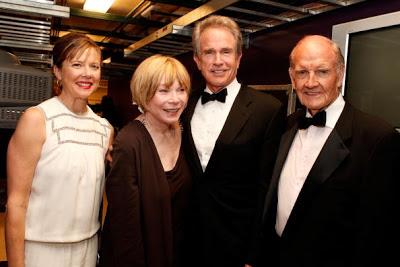 McGovern at one of his final public appearances: the AFI Tribute to Shirley MacLaine, on June 7, 2012.
McGovern at one of his final public appearances: the AFI Tribute to Shirley MacLaine, on June 7, 2012. I’ve always viewed you as a realistic optimist. Bearing that in mind, what do you see as being the major problems facing our country over the next decade, and what are some of the solutions to those problems?
Number one, health care. It’s ridiculous that we’re the only industrial country on the planet that doesn’t have comprehensive health care. I would get to that in what I think is a rather simple way: I would simply start by extending Medicare in stages to different age groups. I would say ‘Congress hereby declares that all Americans from birth through the age of six, shall be covered by Medicare.’ Two years later, all those from seven through eighteen. Two years later, all those from 19-35, and so on. And then everybody would have what I have now, and what every other person over 65 has, and that’s government-paid health insurance. Why should I get all of that at the age of 83, when my grandchildren, who need it more than I do, don’t get it? I think you could sell that to the American people. Secondly, we’ve got to change American foreign policy from one of confrontation, go-it-alone, to-hell-with-everybody else attitude and learn to work in a more cooperative and multilateral way in dealing with international problems. Another thing I would deal with is the collapse of the American railway system. We used to be the number one railway nation in the world, and I’d like to see us achieve that again. We ought to have the fastest, cleanest in terms of the way it’s powered, safest rail system in the world and it ought to be integrated with a modern system of public transit in the cities in America. Then we’ve got to do something about the crisis and cost of higher education. I don’t know how the ordinary, middle class family can send a child to Stanford or Brown or Princeton, or many of these schools across the country. I’d like to see something like the G.I. Bill of Rights, which allowed me to go all the way through to a PhD at Northwestern, a great university, and it didn’t cost me a dime! I even got a living allowance during that time. I’d like to see that extended to all Americans who’d like to continue with higher education. Those are just a few of the things that are on my mind today.
